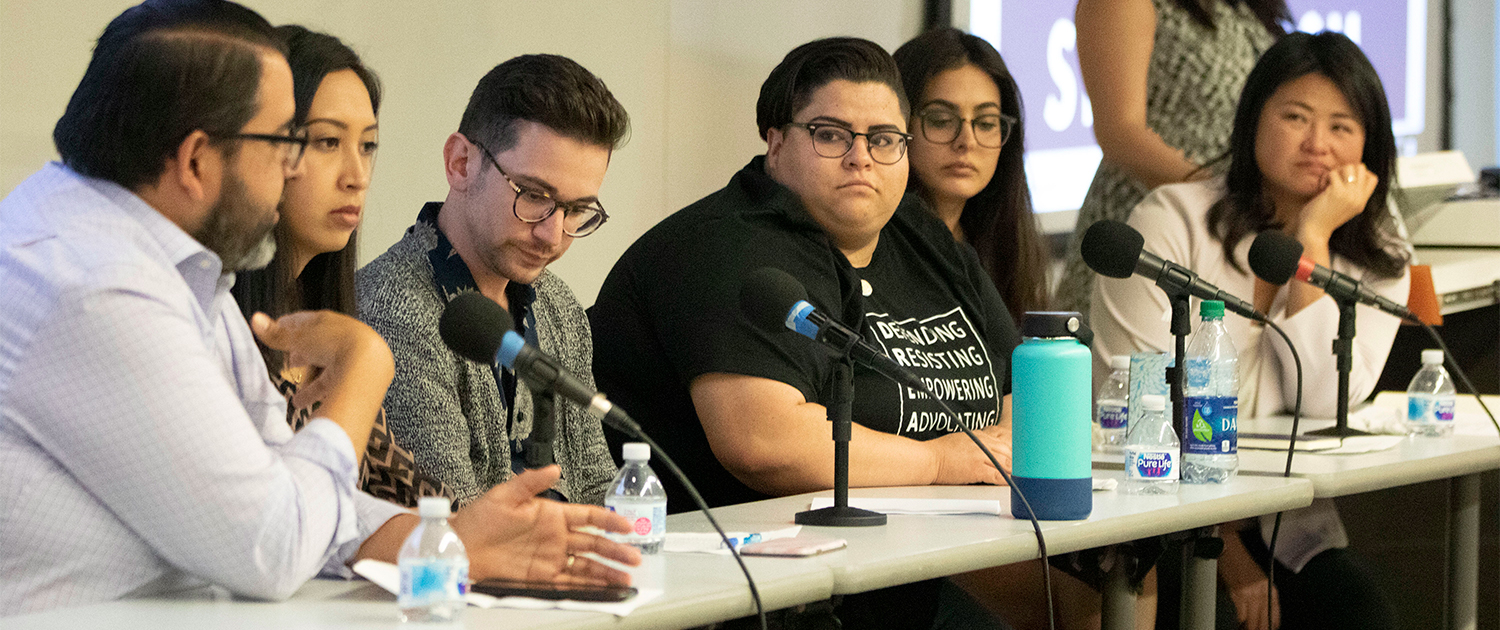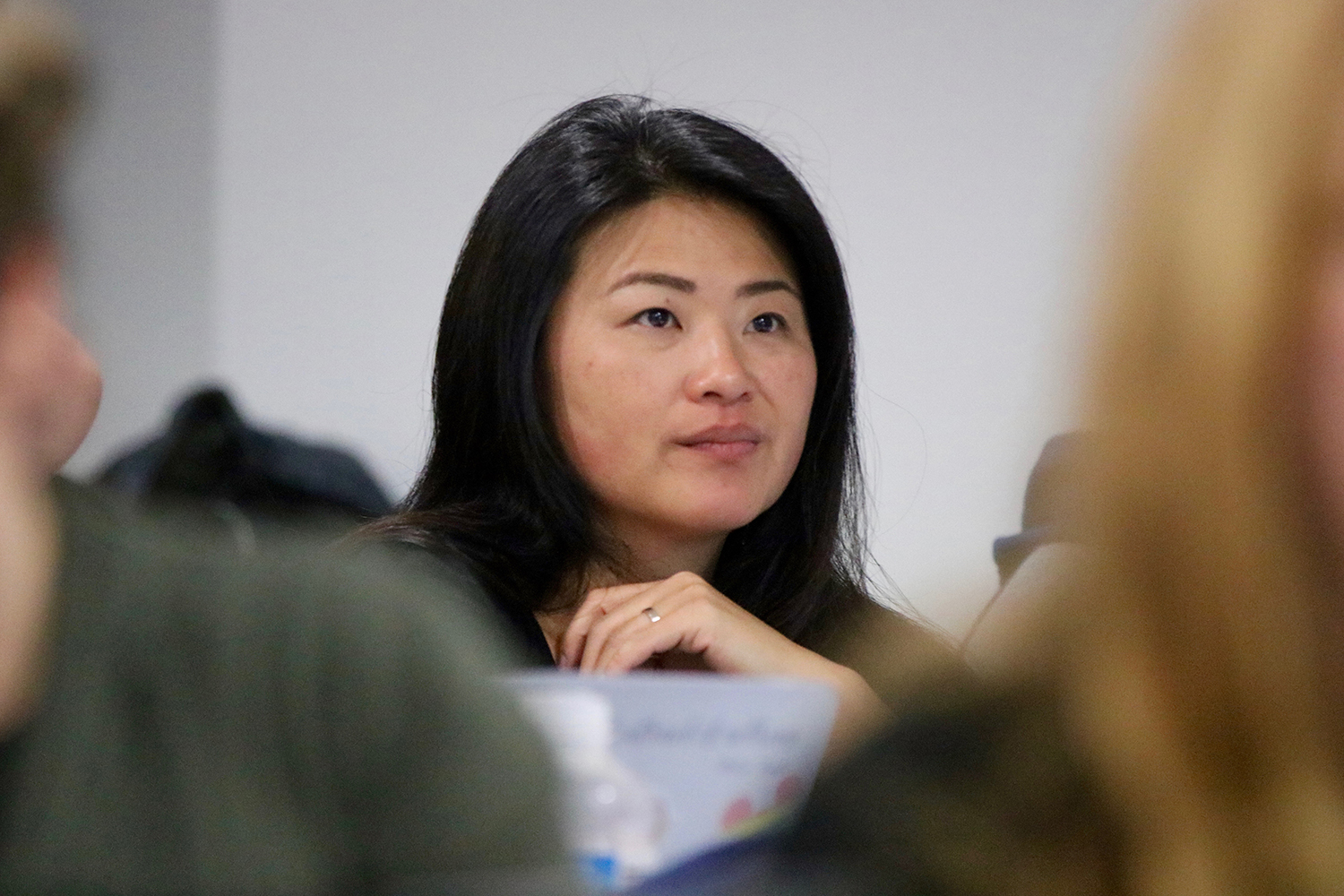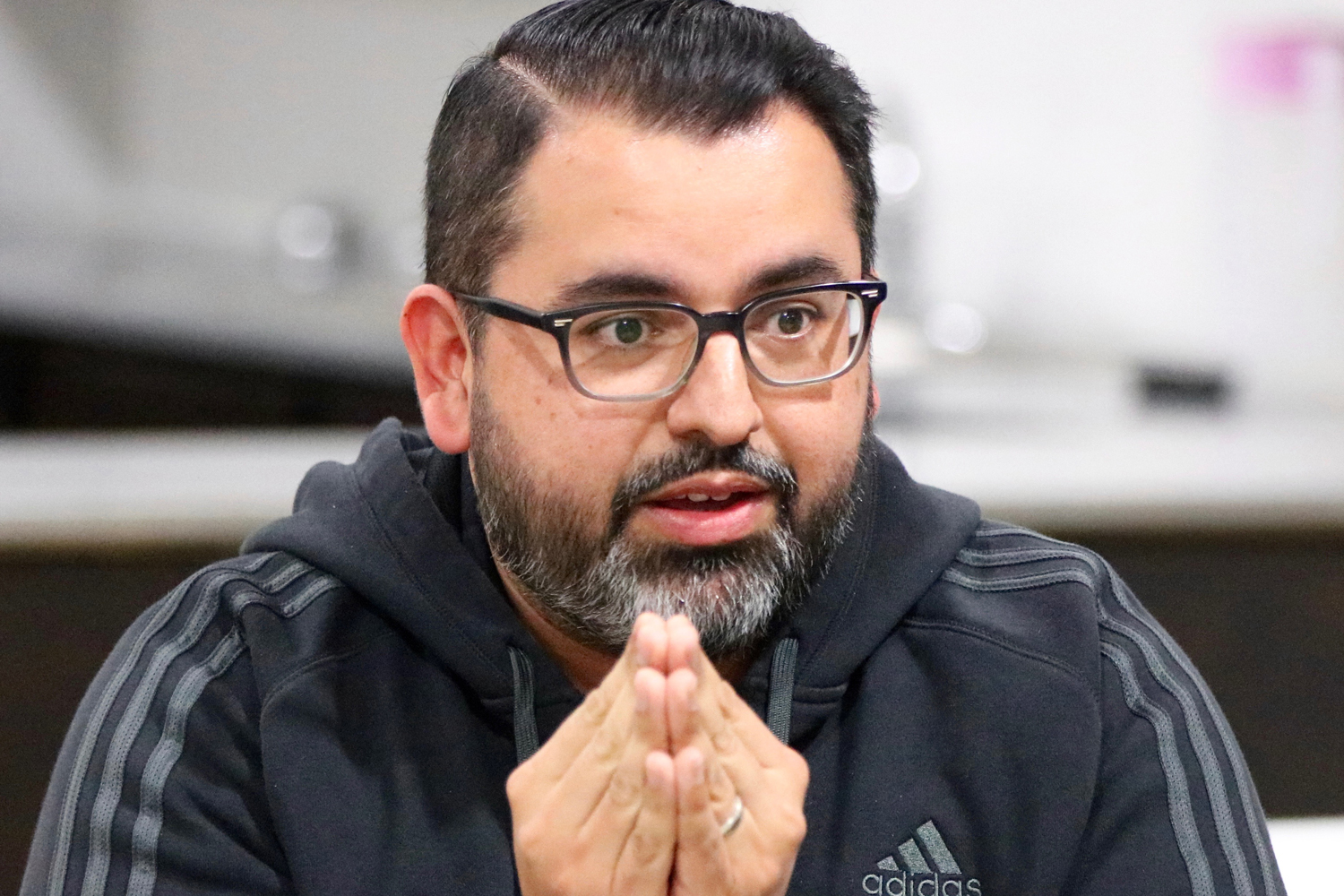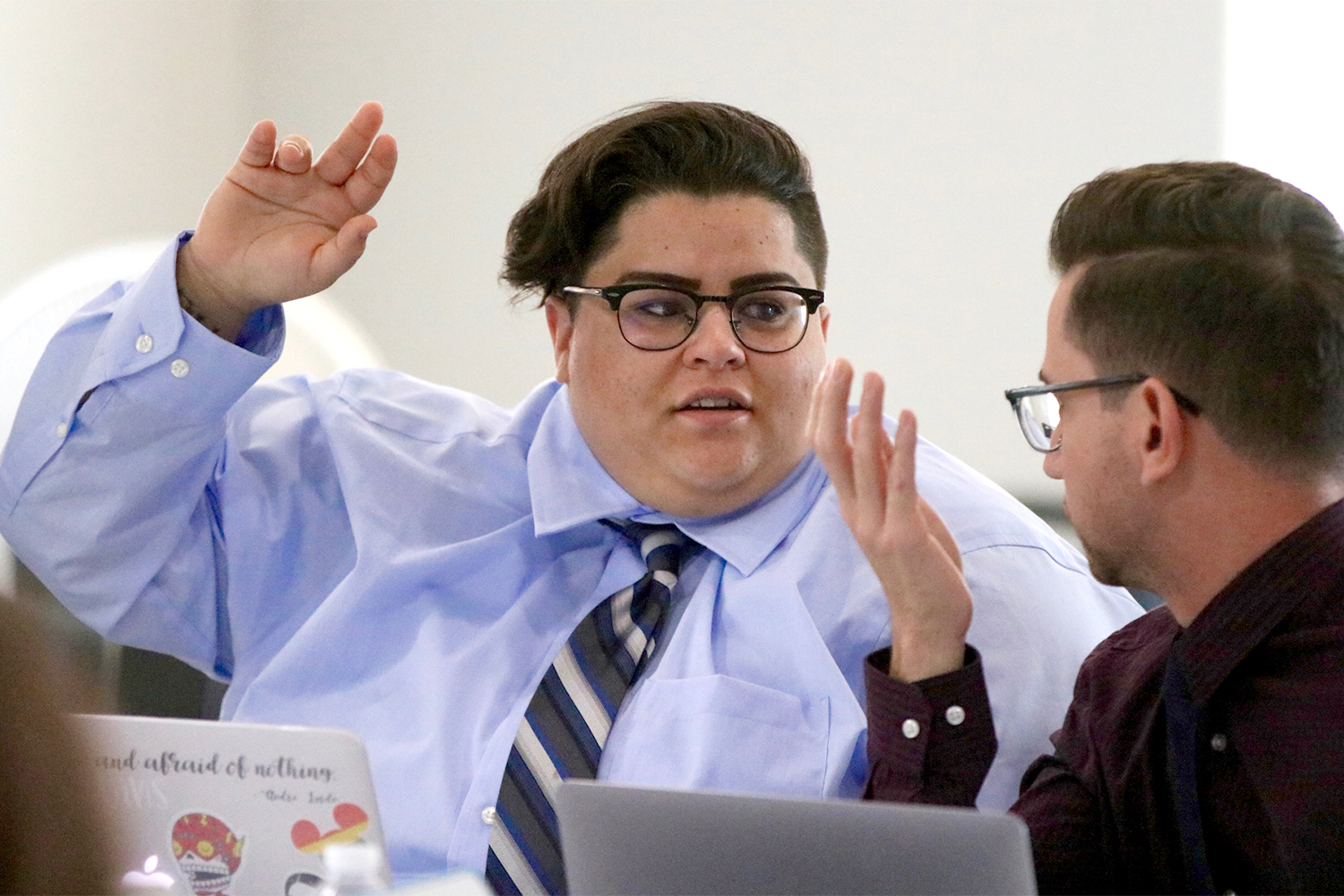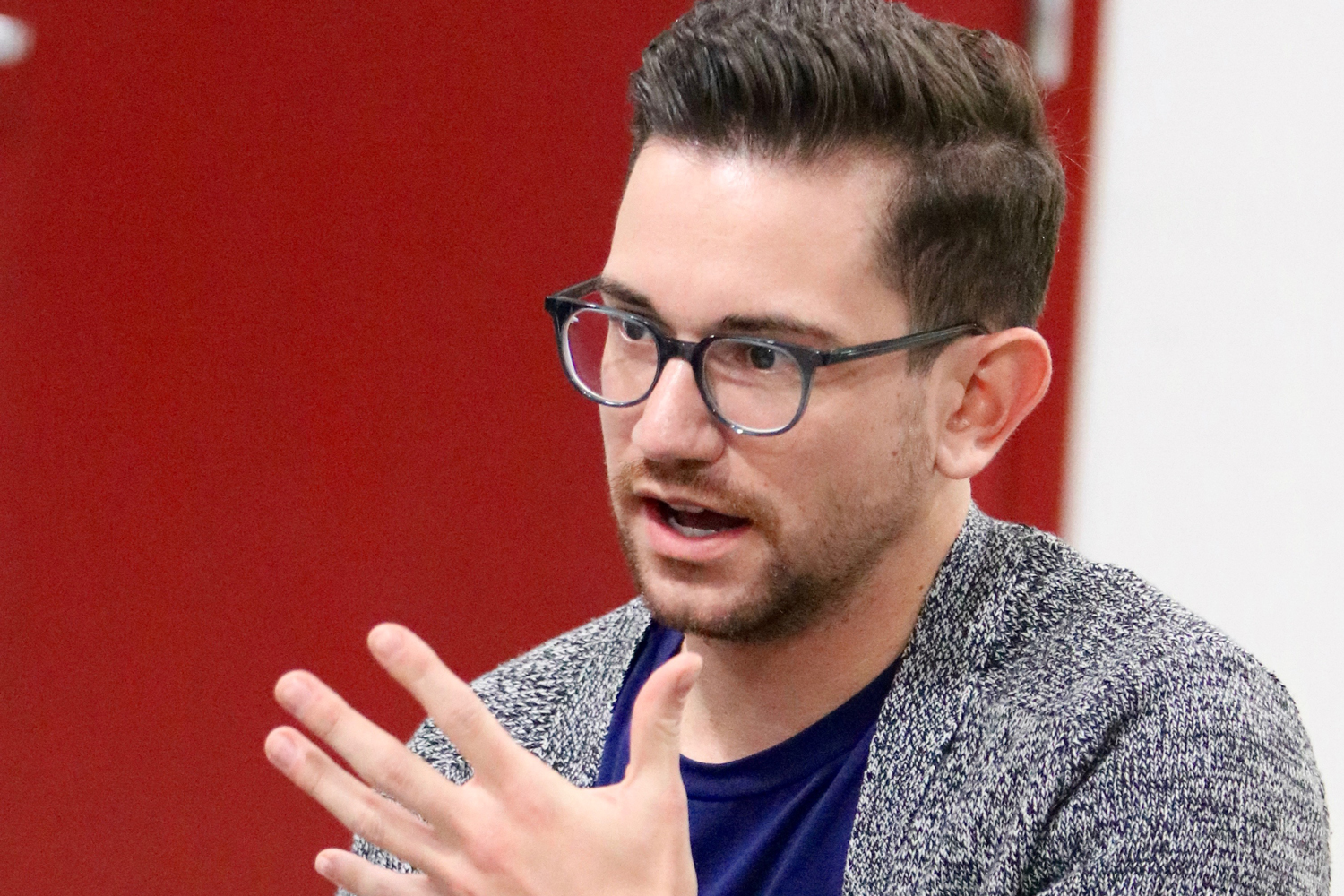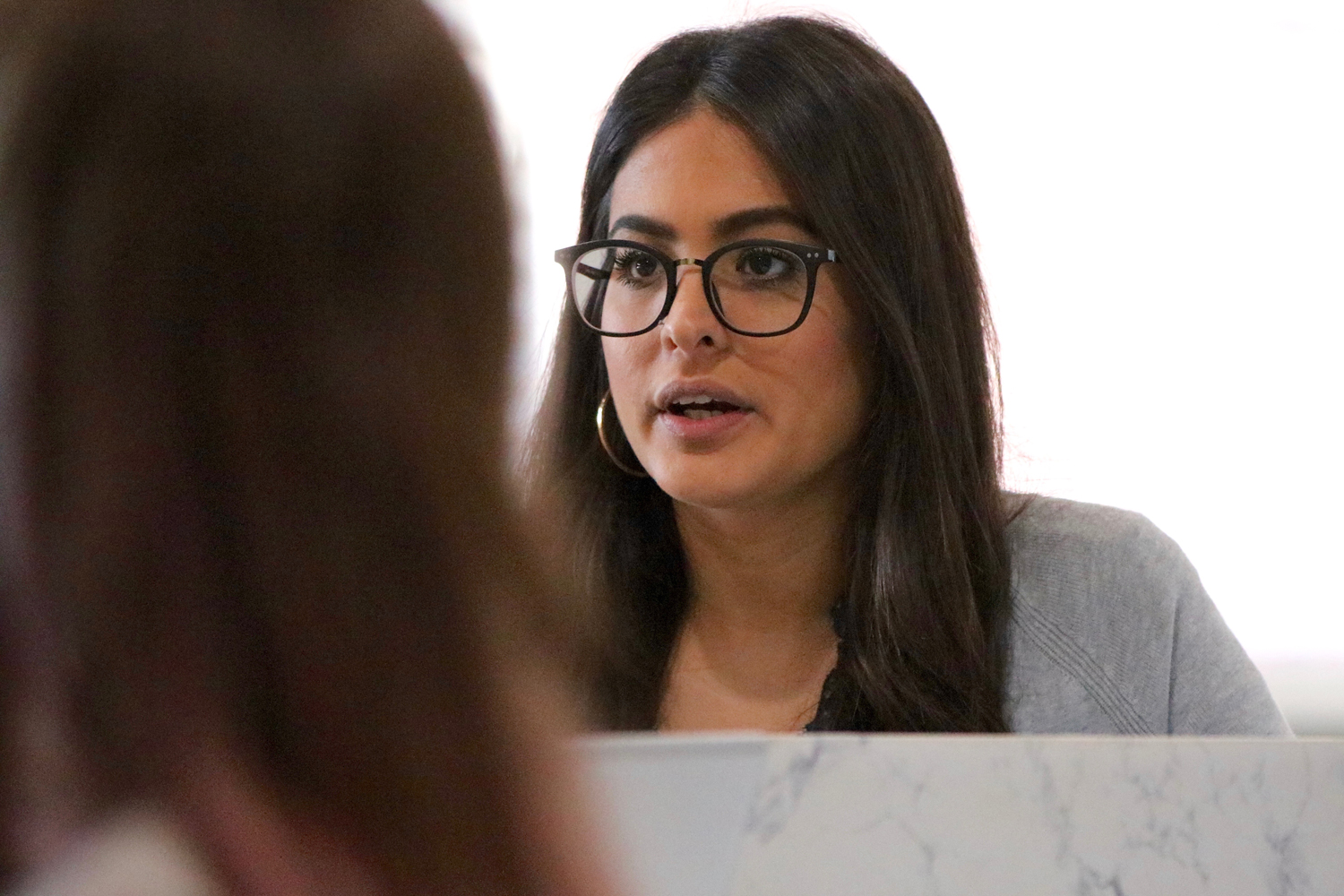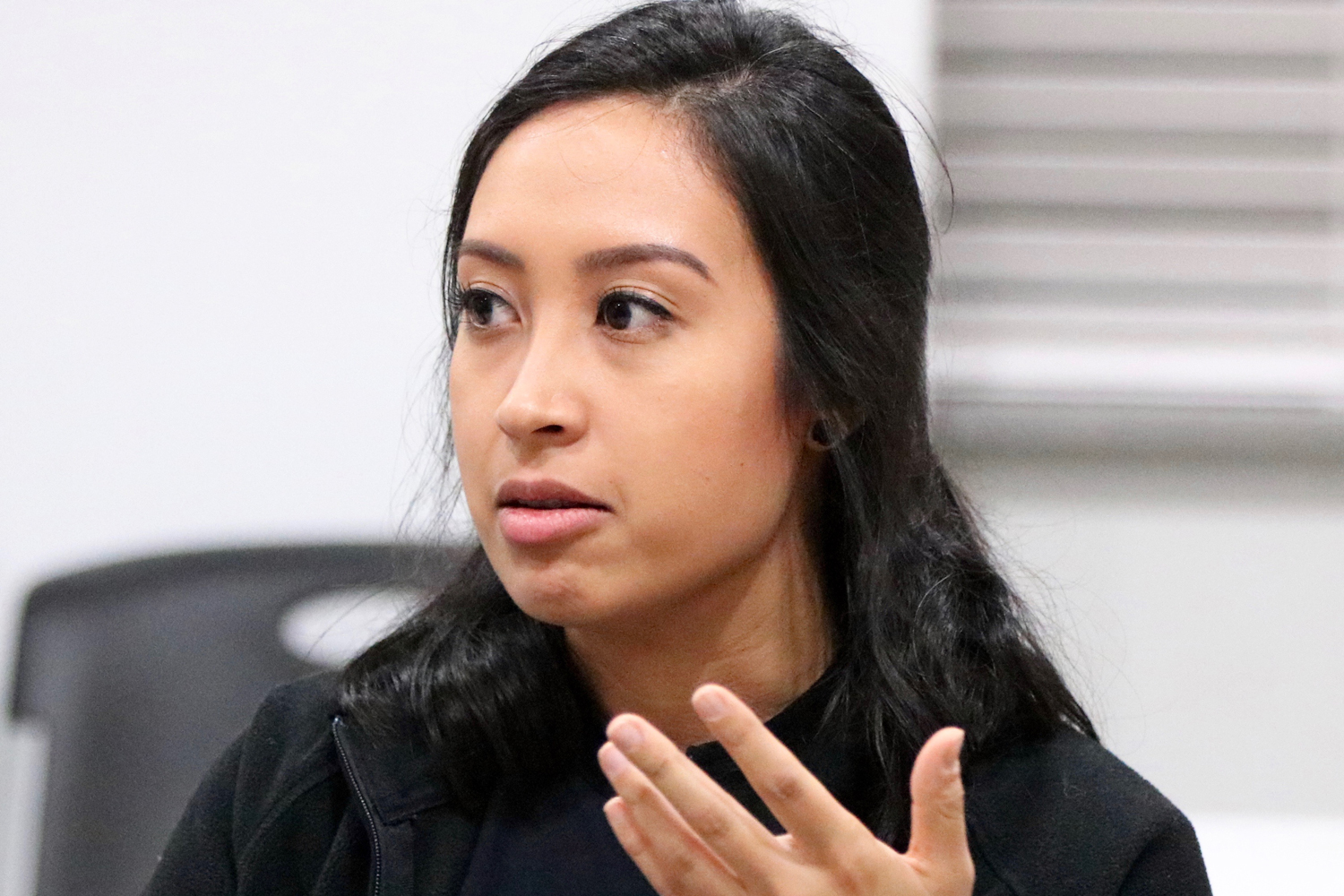After returning from their week at the detention facility in Texas, the four students and two faculty members from UCLA Luskin Social Welfare wrote personal essays, poems and letters about their experiences. Those writings were later shared publicly during an event at UCLA Luskin.
Read these moving personal reflections below.
Ayako Miyashita Ochoa
Adjunct Faculty of Social Welfare
Reflections on Dilley
Child recycling criminals. Drug traffickers. Line-jumpers looking for hand-outs.
Innocents chased by senseless violence. Survivors of domestic abuse. Bystanders of economies crushed by the American thirst for illicit drugs.
How the story gets told depends on who’s doing the telling.
Nestled cozily next to a men’s prison in rural Texas sits a nondescript collection of portable buildings collecting dust. From the dirt road, it cannot be seen and the entrance is a bunker taken up mostly by the security operation at the facility. A machine scans all belongings, and guards that like to be called “staff” check our bodies for contraband and weapons. We participate in a name-based check-in process as formal volunteers in the South Texas Family Residential Center. We must show government identification, and while California stopped issuing an actual bar card years ago, I have printed mine on paper and attached it to my driver’s license. We exchange our ID for badges and traverse a short 10-step distance. We don’t know it yet, but this is where you will catch your last few breaths of dusty air before entering the portable facility where the legal operation is underway.
Guards flank both doorways at the front and back of the bunker. When you first walk in, you see tape on the floor creating a box about 2 feet by 3 feet. I stand in the box wondering if I am allowed to move. It’s the first moment of hesitation I allow to touch me. Even I, a volunteer, do not feel free. I surreptitiously glance to the right where the guard is sitting and proceed slowly to walk into the room.
Volunteers that came to the trailer earlier are already filing out, and there seems to be a lunchtime lull with no lunch happening. It won’t be but an hour before women and children begin filling in for the first “charla.” One of the three group “conversations” about what to expect — meant to provide needed education to the women coming through the detention facility — is vital to the process. This is where the most important information about our country’s complicated immigration system will be shared with shell-shocked mothers and their sick children. Missing this information, not being able to absorb it all, will come at a high cost down the road.
The volunteer operation on the ground (referred to as “OTG”) includes mostly young, mostly white women working 16-plus hours a day providing universal representation to the thousands of women and children coming through the detention facility. With a capacity over 2,000, the detention center is the largest operation of its kind. This is no small number of people. The scale of the calamity in the institution’s very own existence casts a shadow over us.
The trailer includes private meeting rooms built around the perimeter, each holding a table and chairs. Throughout are more tables and chairs. At the center, there are a set of file boxes holding resource documents and forms for intake. Standing against a pillar are samples of Department of Homeland Security notices magnified to poster-sized replicas mounted on foam core. In the center are two sets of chairs forming circles. One room around the perimeter is reserved for the children to wait while their mothers are meeting with staff and volunteers. Two are reserved for workrooms, referred to as the “peanut butter and jelly” rooms, where staff work, meet and volunteers check in.
There is one woman who appears to be the administrative hub for the entire operation. Her tall, thin, slightly slouched and smiling countenance is unfazed by the hustle surrounding her. She walks around with a laptop precariously perched on one arm. She types with one hand faster than most people type with two. In the days coming, I will see her flustered exactly one time. Even then, she miraculously recovers, bouncing back within minutes. She appears to excel at disregarding how the operation affects her person. That seems to be the case for a whole lot of staff. Her job, all of their jobs, is to make sure no client is forgotten and that all the women are prepared for their credible fear interviews with asylum officers. She, along with the handful of attorneys and paralegals that come through on staggered schedules, operate daily in a state of barely controlled chaos. The calm can only be surface deep. There is nothing good that comes from imprisoning innocent women and children — so they focus only on this one singular task at hand.
The work here is simple. Explain asylum law, identify legally relevant facts, prepare traumatized women and their children to serve as their own legal counsel, prepare them for the years-long battle they will face in immigration court (if they are lucky), try to ignore the possibility that some may be sent back to war-like conditions, and get these women, perfect strangers, to tell them their deepest, darkest, buried secrets, sometimes in a borrowed language that is native to neither party. Better yet, they must get these women to tell their unprepared volunteers, people like me, their intensely personal tragedies.
Burnout among those working the front lines appears to be the only option here. What else could be the norm in a situation like this? As a person who gets to walk away from this facility after a weeklong stint, it’s easy to judge how extraordinary these circumstances are. For the women and their children, however, getting to Dilley, being in the facility — this is not the worst they’ve seen. At least here, there appear to be people that seem to want to help. Nonetheless, the uncertainty is unparalleled for an American like me. I realize that for many of the women I met, and their children by extension, this disequilibrium has been constant for the entirety of their lives.
And that’s when it occurs to me that perhaps we have more in common than I first assumed. In the far-off places, in the smallest of villages in Central America, to the large sprawling cities in between and across, and in these borderlands, we are plagued by bad people and even worse institutions. I realize these bad people and even worse institutions have chosen fear as their currency. They peddle everyday terrorism, making us believe that we aren’t all the same, that “othering” will help us stay ahead, hoping we don’t wake up to the realization that the odds were always stacked against everyday people. Fear has no place in mediating humanity, and we cannot settle, now or ever.
I don’t believe in superheroes. But I do believe in the power of numbers. And there are more of us than there are of them.
While many of us on this side of the border have been spared shares of pain and suffering that our brothers and sisters to the south of us have suffered, we all know pain and we all know suffering. My only hope is that this truth, this knowledge, binds us as we move forward together.
Sergio R. Serna, LCSW
Field Education Faculty, Social Welfare
Recollections and Reflections
On the day before our trip to Texas, President Trump declared a national state of emergency to fund the building of a border wall without Congressional approval. His rhetoric about crime and the wall has placed a brown, Latin American face on the boogeyman. And it is with this narrative that we justify placing women and children in detention under the guise of protecting those of us on this side of the border.
This wall is a symbol, as much as a barrier alerting those who might seek asylum, escape from persecution or even hope for a better life to turn around. I don’t know what this proposed wall will look like, and I will likely never see it because I was born here and I’m safely positioned on the right side of the border. But I can read between the lines, between the bars, between the bricks, and I see the words — KEEP OUT and NOT WELCOME! This further solidifies the fact that I do not belong, nor do those people who speak my mother tongue, look like me and share a part of my culture.
I was further reminded of this when we arrived in Texas and I immediately felt like we needed to conceal parts of our identities. I along with another faculty member from UCLA and four Master of Social Welfare students were volunteering at the South Texas Family Residential Facility in Dilley, Texas. I recalled a moment of fear and discomfort as our team was sitting eating BBQ at a roadside restaurant next to a table full of bikers for Trump, and I realized we were a table of full of sexual, gender and racial minorities. Here we were in Texas to help women and children who had entered the country without permission, and we were sitting next to a table full of white men who supported a man whose policies were filling the very detention center we would soon be visiting in Dilley.
The detention center wasn’t visible from the main road. There was no sign, just a long rocky dirt road with a parking lot and a fence and some bungalows. The guards in the legal aid trailer were unassuming, wearing khaki pants and maroon polo shirts. Mothers and their children enter from the opposite end of the trailer and wait to be seen. I was struck by the bright reds and blues and fluorescent green shirts worn by the women and their children. I tried to decipher if this was some sort of classification system based on color, but I became distracted by the sound of children, some laughing, some crying and many coughing.
I felt overwhelmed, not by the task, but by the fact that these women and especially these children did not belong here. I was overwhelmed by the number of women and children I saw and anticipated seeing over the next week. For a moment, I could feel my face showing the disgust I have for any policy that would detain a child and for anyone who would enforce that policy. But I am not here to be a self-righteous social worker; I am here to sit and listen and build trust and maybe piece together a story that can help a mother and her children clear an artificial hurdle to move them closer to a safe and stable existence in the United States.
For the next week, I asked questions and I listened as these mothers shared their most intimate moments of pain and fear with me. They told stories of persecution, abuse, fear and loss. They fled their countries of origin in order to save their lives and the lives of their loved ones. For them it wasn’t about the typical dream for a better life. It was about self-preservation. It was about living. The women I spoke to traveled weeks at great risk to themselves and their children because they had no choice, because not leaving meant that they would certainly suffer, that they would die and so would their children and families.
It was in these moments that I heard the worst of human nature in the stories of their persecution and then witnessed amazing strength and resilience in the ways these women and their families navigated these experiences. They showed true bravery in their migration north and in those moments when they were losing hope — right up until the moment that they attempted to enter a foreign country and seek asylum. In this desperation, I do not see individuals who seek to intentionally break the laws of the United States. I see individuals who are compelled to do so because they have no other option. They could no longer wait to see if they could get their names on a list they heard might exist to get them over the border. They could no longer seek a mysterious man that American border officials told them to find in Mexico in order to get on a list in hopes of crossing. And they certainly could no longer wait when American officials were telling them that if they stayed they would arrest them and separate them from their children.
The fear they felt and their stories of trauma were real; they were not feigning emotional injury. Many were running from the very gangs the U.S. president uses to characterize immigrants coming from Central America. It was these stories and other stories of trauma, pain and loss that as volunteers at the detention facility we had to hear and attempt to process for them and ourselves. Their stories of trauma were just as visible as their brightly colored clothes. Beyond the tears, anxiety and confusion in the mothers, were their children. The ages of the children varied from under a year old up to the late teens. We noticed that most of the younger children were sick with coughs, fevers and runny noses. Mothers expressed concern about their children not eating or sleeping well and how some had started to wet the bed again. I realize now how naive I was when I noticed how well-behaved many children were and how young and underdeveloped they seemed. Upon reflection, this could all be caused by their exposure to complex traumas, and we were there witnessing and documenting the manifestations of those experiences.
As we came to learn from their interactions with American border officials, these women and children were threatened and suffered — not only in their countries of origin but here in the United States. They all told stories of sitting in wet clothes for a day or two when they were first detained at “la hielera,” which explained why so many of them were sick. I am troubled that they made the statement not as a complaint, but passive acceptance that it was part of their punishment for crossing into the United States without permission — as was not receiving proper meals or drinking water during their stays in cramped rooms with a dozen other mothers and their children. They slept on the floor directly next to the toilet because of the lack of space. Again, it was not a complaint but just another memory to add to their larger story of maltreatment and trauma.
They were not the only ones suffering the effects of trauma — so was the legal team and so did we as volunteers. The task of preparing mothers for credible fear interviews meant uncovering old wounds and further opening newer ones. There were bound to be other individuals who would be affected by hearing their stories. We were not prepared emotionally to be part of a team that was churning out these painful narratives of trauma in our attempts to prepare mothers for their interviews. I can honestly say that after 10 years of being a social worker in the field, I was not prepared for this. The stories immediately weighed heavily on my body. I found myself fighting back tears during the day; my mind was flooded with the images I had solicited from the mothers. I was exhausted every day after leaving the detention center, and yet I had difficulty closing my eyes at night and then opening them again in the morning. From the stories I heard from my colleague and the students we had traveled with, I know I was not the only one. I also saw it at the large round tables when we met with other volunteers there with us for the week.
When I realized the impact, I was frightened for the legal team who does this work day in and day out. I noticed many of them were sick, like the mothers and children in the detention center. We can only handle so much pain before our bodies warn us through illness or exhaustion. The legal team had the added emotional burden of hearing every story. They not only heard and felt the trauma from the stories that were told to them personally by the clients but also those collected by the volunteers. The legal team is fighting for children and families, so they are resolute in their work. I saw them rejoice in their victories, and I’m sure that fueled their commitment to come back every day and stand up against injustice as long as they could, both physically and emotionally.
Our work at the detention center was time-limited. When I left, I felt like I was running away from the painful memories shared with me by the families. I didn’t leave feeling satisfied by the work or how the families had been positioned legally if they were released. When I arrived back home, although I was glad to see my family, something didn’t feel right. I did not rest easy that first night or the nights that followed. I had left the detention center and the families had remained. It was the same feeling I had every time I left the detention center, but this time I didn’t have the option of going back the next day. The day I came home, I received a message from a member of our team with a picture of a woman who had been detained and would soon reunite with her family. I cried. They were the hot tears that had been percolating over the past week. They tasted of joy and pain and guilt.
We have received great news from the legal team in Dilley about individual clients having positive outcomes regarding their credible fear interviews. Although it’s just the beginning for these family’s legal battles, it’s still a win. Though bittersweet, we must embrace it. We were also notified that because of our inquiries and identification of children under 1 year old, a complaint was filed with the Department of Homeland Security. As a result, 15 babies were released.
I must admit that the feeling of pain and guilt has softened as the weeks have gone by since our trip to Texas, but the memories of clients linger, as do thoughts of the unsure futures of the families, both legally and emotionally. I worry about the lasting effects of their trauma and how that will manifest in the future. I’m left with those thoughts, and how and when I’m going to continue to help. And like the families that came to the border seeking asylum, I see that I have no choice. I cannot turn back. I cannot unsee the things I’ve seen. I must act and I must move forward.
Angela “Angie” Garcia
Social Welfare, Class of 2019
A Poem (in Spanish)
Querida madre,
Perdón que te tuve que decir que tu sufrimiento no es suficiente.
Tú eres más fuerte de lo que imaginas.
Perdón que mi país insiste que tu humanidad no es suficiente para dejarte vivir una vida libre de miedo.
Tú mereces ser tratada con dignidad, tu habilidad de sobrevivir es admirable.
Perdón por no tomar más tiempo para conocerte antes de preguntar sobre los momentos más íntimos de tu vida.
Tú eres capaz de una recuperación hermosa, cuando miras a tu hijo le das esperanza para el futuro.
Perdón que no pude darle un poco de comida a tu hijo.
Tu hijo te ve como su héroe, para el eres la Mujer Maravilla.
Perdón que cuando me quisiste dar un abrazo por ayudarte tuve que bloquear tus brazos.
Tu felicidad me causó que mi corazón latiera más rápido, si pudiera te abrazaría más fuerte. Espero que te veas de la manera en la que yo te veo. Chingona.
Perdón que duramos 5 horas en un cuarto pidiendo que me dijeras más instancias de violencia que has vivido.
Tu habilidad y persistencia en encontrar una salida me inspiro, tú nunca te venciste.
Perdón que pasaste por un momento en que verdaderamente pensaste que tu vida no existiría más.
Tú nunca paraste de darle gracias a dios, tú supiste ver lo bueno entre todo. Una cosa que en ese momento se hizo difícil a mí.
Perdón que tuviste que escoger entre la seguridad de un hijo a otro por falta de dinero.
Tú nunca te pusiste primero, tus hijos algún día se darán cuenta que grande fue tu sacrificio.
Perdón que te separaron de tu hijo que tan sólo días había cumplido los 18 años.
Tus lágrimas de dolor serán la leña que encenderá tu determinación de tenerlo cerca nuevamente.
Perdón que tuviste que ver la vida de tus más queridos desaparecer.
Tu habilidad de seguir luchando me recuerda del amor de mi madre que sigue latiendo más fuerte todos los días.
Perdón que no pude hacer más, perdón que en tiempos no sabía que decir.
Tú me inspiras, tú me motivas, tú me empujas. Tú serás la razón que seguiré gritando por una solución mejor.
Querida madre. Te vemos, te escuchamos, luchamos por ti.
Anthony Gómez
Social Welfare, Class of 2020
Four Hours
“I’m sorry” has never felt so empty. Even though I say it with a lump in my throat, even though I am holding your hand, even though I am feeling what you’re feeling, it isn’t enough. “I’m sorry” falls flat. “I’m sorry” feels cheap.
It feels cheap because no matter what I say, I can’t undo the experiences that have caused you so much pain. I can’t change the fact that you’re trapped in a soulless, arbitrary legal process that forces you to relive the most painful traumas of your life. And most of all, I can’t guarantee you that everything will be all right. So instead, I reach across the table and hold your hand. I sit with you in this moment and tell you that during these four hours, it’s OK to cry. I try my best to assure you that you can trust me, that I’m only here to help you and that I’m not a part of my toxic government. And while my face may not wear the same veil of disdain worn by the others you’ve come across in this country, you’re probably wondering how much can you really trust me? How many times have people that looked like me promised to help you, only for them to let you down?
Despite your uncertainty, you open up to me. You listen as I guide you through the process of recounting the myriad reasons you fled your home and gracefully tolerate my invasive questions that require you to unbox your most painful memories. Throughout the process, I force you to remember that there is no going back to your family home. I make you relive the deaths of the loved ones you’ve lost. I oblige you to think of your children that you left behind and haven’t heard from since you entered the U.S. I can only imagine how many times the room started spinning when I asked you for more details, or how many times you felt there wasn’t enough oxygen in the room when I asked a question you were dreading I’d ask. Even though there are things you’ve never told anyone else about, even though the words burn as they pass your lips, you let yourself be vulnerable. For four hours, you let me into your life and, together, we sit in your experience. Even when “I’m sorry” rings hollow in the moment, you assume the best intentions and allow yourself to feel my empathy.
But like I said, within these four hours I can’t change a system that has no regard for basic human rights, nor can I promise you that this will all be over soon. I can tell you, though, how I feel. I am humbled by your bravery. Even as fear has taken a permanent residence in your gut, you haven’t surrendered to its grasp. I am honored by your resilience. After 10 lifetimes worth of adversity, you have pressed on through conditions and situations many haven’t survived. In your country, you proudly forged a successful career and raised a beautiful family. When that was no longer possible, you did the only thing you could to ensure your family’s survival.
At the same time, I am embarrassed. I am embarrassed that my country doesn’t believe you. I am ashamed that many in our country have the egocentric audacity to think that leaving your family, home, and career was easy — that they think you didn’t “try hard enough” to fix your country and simply sought the easy way out. I am disgusted that our politicians fuel xenophobic rhetoric that suffocates your narrative, one that intrinsically embodies more “American” values than our most patriotic citizens.
Most of all, I feel guilty. I feel guilty that, despite the fact that we speak the same language and have similar cultures, I live a life of tremendously undeserved privilege because I was born on a particular side of an imaginary line humans insist is real. Due to this insignificant fact, I’ll be considered a “testament to my race” while you are categorically considered a “national emergency.”
As our time together draws to an end, we both realize that the “hello” we spoke just a few hours ago was also a goodbye. In that moment, I wish I could tell you I’ll be there every step of the way to help you navigate this complicated, dehumanizing system — that I’ll be a constant in a whirlwind of fleeting figures promising to help you. But you and I both know that isn’t the case. When it comes time to say goodbye, we exchange Que Dios le bendiga and you hold onto my hand. As I feel the warmth of your hand in mine, I look into your eyes and I see your gratitude, appreciation and fear. Tears well in your eyes and once more my throat constricts as I fight every instinct to let my emotions overwhelm me and embrace you. You tell me, Usted fue la primera persona que me creó. Usted me hizo recordar que no soy debil, que soy fuerte, resistente, y que he superado tanto. Usted me enseñó que tomé la mejor decisión posible y que soy buena madre. Por usted, me acordé de que todavía existen buenas personas. Usted ha sido mi ángel, y por eso, le agradezco tanto. Even as you insist that I have provided you with so much, I feel I have failed you. As I watch you return to the facility, I feel ill that I can’t do more to dismantle a system that will continue to harm you and others like you. I feel suffocated by a system that is so daunting. I feel helpless.
I hope you know that I will always be rooting for you. I hope you find others that also see your bravery, resilience and genuineness, and that they provide you with the tools you need to continue to be the resourceful person you’ve always been. I hope you find people who will be a constant support that you can be vulnerable with. I pray that despite the trauma they’ve experienced, your children feel the joy and curiosity that every child deserves. As I write this, months later, I still don’t have the answers to the questions we shared during our four hours together. Just know that, like you, I’m not giving up.
Fatima Gonzalez
Social Welfare, Class of 2019
Letter to a Refugee Mother
Where to begin? Maybe in sharing that when we finished our interview, I broke down.
I didn’t understand. I questioned why the world was so cruel and unfair. I questioned how you were surviving in such a cold and degrading place. I questioned why you and your babies were being treated like criminals for simply fighting for your lives. I questioned how others think it’s acceptable to treat fellow humans like this. I questioned what the future held for you, your babies and all of the other families in that detention center.
You recounted your harrowing and traumatic story from start to finish with me, a complete stranger, as you held your sleeping 20-month-old baby in your arms. And you not only told your story with your baby in your arms, but you also crossed two countries over a two-month period with two other young children.
You are powerful. You are resilient. You are deserving. You are inspiring.
You fled Honduras because it was the only option — the last option. You did the only thing that could save your life and the lives of your beautiful, big-browned-eyed, dark-skinned babies.
I apologize for the way this country (my country) welcomed you.
I apologize that because you and I were born in different countries, we were handed different — unjust — destinies.
I apologize that our country of birth is the only element that sets us apart.
I apologize that you are seen as a criminal, an unwelcomed inconvenience in this country.
I apologize that “45” thinks that the solution to the unmentionable threats and fear you faced in Honduras is a wall.
I wish I could do more. I wish I knew where to start.
I left that week feeling disappointed and overwhelmed. I also left that week feeling grateful for your existence, for the light and strength you bring to this often-dim world.
With love,
Fatty
Marianna Hernandez
Social Welfare, Class of 2019
Letter to a Refugee Mother
I wish I had a magic wand to make all this go away.
I wish this was all a big nightmare that you and your daughter could wake out of. I know that nothing I say can take away the pain that you and your 10-year-old daughter are going through. Nothing I say or do will take back the fact that you are fleeing your country because your life — and that of your daughter — is in danger.
You made the difficult decision to leave behind your oldest daughter because you didn’t have enough money to bring her. I can only begin to imagine how painful it must have been to choose between your two daughters. No mother should ever be put in that position.
You and your daughter traveled through two countries for one month to get to the U.S. in search of basic survival. You attempted to cross the “right way” through the legal port of entry, but you were turned away.
You and your daughter had no choice but to cross the river late at night. You held on tight to your daughter as you navigated the cold river and its merciless currents. You almost drowned in the river and, in that moment, you questioned whether this whole thing was even worth it. You collapsed to the ground when you finally reached land on the other side because your lungs were so exhausted. You remember your daughter panicking, desperately crying and yelling as she watched you lying on the ground. She cried out for help and prayed to God that her mother would not die. You shared that your daughter has not been the same little 10-year-old girl since that day.
I need you to know that you and your daughter are some of the most brave and resilient people I have ever met. There aren’t enough words to explain how much I admire your courage.
I also need to apologize on behalf of the United States of America. I am sorry that you have been degraded and humiliated by Americans. I am sorry that border patrol officials asked if you were infected with any diseases as if you were some animal. I am sorry that the official in the Hieleras [immingration law center] thought it was OK to sarcastically say that you would be receiving an aluminum blanket like the ones used by NASA. I am sorry that another agent told you to pick up your trash as he pointed down at your daughter while she slept. You and your daughter do not deserve to be treated in such a dehumanizing way for simply seeking survival. I am disgusted that my home country has treated you and your daughter in this horrible manner. You are escaping violence in your native country, only to find that the U.S. government is perpetuating it against people like you. I am sorry none of this makes sense.
Your words continue to linger in my head. You asked me, “Why do they treat us like that?” I wish I had a rational answer for you but I do not.
In your frustration, you also told me that you and I are equals in the eyes of God, but I happen to be born on the right side of the border.
Your words pierced through my soul, but you are absolutely right. None of this makes sense, and there is nothing that makes me a better person than you.
I am sorry that you were made to feel less. Your existence is worthy and it matters.
All I have left to say is thank you. Thank you for blindly trusting me with your story and sharing the most intimate moments of your life with me. Thank you for making the treacherous journey — because of it, our paths crossed. I am humbled to have met you and your daughter.
